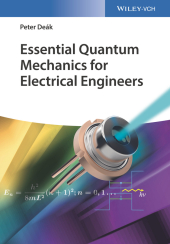 Neuerscheinungen 2017Stand: 2020-02-01 |
Schnellsuche
ISBN/Stichwort/Autor
|
Herderstraße 10
10625 Berlin
Tel.: 030 315 714 16
Fax 030 315 714 14
info@buchspektrum.de |

Peter Deák
Essential Quantum Mechanics for Electrical Engineers
1. Auflage. 2017. XVIII S. 6 SW-Abb., 3 Farbabb., 5 Tabellen. 244 mm
Verlag/Jahr: WILEY-VCH 2017
ISBN: 3-527-41355-3 (3527413553)
Neue ISBN: 978-3-527-41355-3 (9783527413553)
Preis und Lieferzeit: Bitte klicken
Der Autor dieses Lehrbuchs ist seit über 25 Jahren Dozent für Quantenmechanik in den Fachrichtungen Elektrotechnik und Informatik. Das Fachbuch ist wissenschaftlich fundiert und gut geschrieben, überzeugt durch eine ausgewogene Darstellung notwendiger formaler Mathematik und Text.
Die Einführung fasst die Grundkonzepte der klassischen Physik zusammen und stellt einiger ihrer Versäumnisse heraus, die sich aus Phänomenen in Verbindung mit der Lichttechnik ergeben. Diese werden in den darauffolgenden drei Kapiteln ausführlich analysiert. Kapitel 5 geht über das Dualitätsprinzip hinaus und erläutert die Partikelkonzepte der Quantenmechanik sowie deren Folgen für die Elektrotechnik. In den Kapiteln 6 bis 8 werden die mathematischen Grundkonstruktionen beschrieben, mit denen sich der Zustand von Partikeln und deren Eigenschaften ableiten und vorhersagen lassen. Die beiden weiteren Kapitel zeigen zwei Beispiele hierfür mit Anwendungen von LEDs, Infrarotdetektoren, Quantenkaskadenlasern, Zener-Dioden und Flash-Speichern. In den letzten Kapiteln werden die Folgen der Quantenmechanik für die chemischen Eigenschaften von Atomen und anderen, aus vielen Elektronen bestehenden Systemen erörtert, abgerundet durch einen kurzen Einblick in die möglichen Hardwarekomponenten für die Quanteninformationsverarbeitung.
Zu den vielfältigen didaktischen Merkmalen gehören auch Lernziele, Kapitelzusammenfassungen, Fragen zur Selbstüberprüfung sowie Problemlösungen. In den beiden Anhängen sind die notwendigen Kenntnisse der klassischen Physik und Mathematik zusammengefasst.
Authored by a lecturer of quantum mechanics for students of electrical engineering and informatics for over 25 years, this textbook is scientifically sound and well-written, striking a balance between the formal mathematics necessary and informal prose.
The introduction summarizes the basic concepts of classical physics and points out some of its failures, based on phenomena connected to lighting technology. These are analyzed in detail in the subsequent three chapters. Chapter 5 goes beyond the duality principle, and explains the particle concept of quantum mechanics and its consequences for electrical engineering, while chapters 6-8 introduce the mathematical construction used for describing the state of a particle and to predict its properties. The next two chapters present two examples of using this framework, with applications in light emitting diodes, infrared detectors, quantum cascade lasers, Zener diodes and flash memories. The final chapters then discuss some consequences of quantum mechanics for the chemical properties of atoms and for other many-electron systems, also providing a short insight into the potential hardware for quantum information processing.
Among the host of didactic features are learning objectives, chapter summaries, self-testing questions, and problems with solutions, while the two appendices summarize the knowledge in classical physics and mathematics needed for this book.
Peter Deák is currently Professor of Theoretical Semiconductor Physics at the University of Bremen, Germany, and head of the Electronic Materials Group in the Bremen Center of Computational Materials Science. After obtaining his PhD at the Eötvös University of Budapest, Hungary, and post-doctoral positions at SUNY, Albany, the Max Planck Institute for Solid State Research in Stuttgart and the University of Kaiserslautern, Germany, he obtained a tenure as professor of surface physics at the Budapest Institute of Technology and Economics in 1993. He relocated to Germany in 2003 where he took up his current position in Bremen. Peter Deák has more than 25 years of experience in teaching physics to undergraduates of electrical engineering and informatics.


